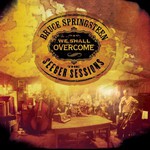We Shall Overcome: The Seeger Sessions
Studio Album by Bruce Springsteen released in 2006We Shall Overcome: The Seeger Sessions review
We Shall Overcome is unique in its sheer kinetic energy
Following his acclaimed, if tad dark back to basics set Devils And Dust, Bruce Springsteen takes another surprising but welcome musical deviation for his twenty-first album. It is a collection of personal interpretations of traditional American folk songs associated with the legendary guiding light of American folk music – Pete Seeger. Seeger turns 87 in a week, and it's the revivalist and popularizer of America's folk heritage rather than the folkie songwriter that Springsteen celebrates in this album. We Shall Overcome: The Seeger Sessions was recorded in Springsteen's New Jersey home with a fourteen-piece band, including horns, banjo, fiddles, washboard, organ and accordion. These were live recordings, done with no rehearsals, and We Shall Overcome: The Seeger Sessions does indeed have an unmistakably loose feel. This music is rowdy and rambling, as the group barrels headfirst into songs that they're playing together as a band for the first time, and it's hard not to get swept up along in their excitement. As ever Springsteen's voice steals the show, even when the music is at its most twee, his gnarly tonsils keep you captivated. Springsteen has made plenty of great records, but We Shall Overcome: The Seeger Sessions is unique in its sheer kinetic energy; he has never made a record that feels as alive as this.
Springsteen discovered most of these tunes on LPs by Pete Seeger
Springsteen has always mined a deep vein of Americana, but with his first-ever album of songs written by other people, it feels like he's turned to the music of the past to find a moral compass for a nation that's gone off the rails. The protest anthems Eyes on the Prize and We Shall Overcome are performed with an understated urgency; the gospel standard Oh, Mary, Don't You Weeps – which Springsteen sings in a gruff Tom Waits-ish baritone and to which the Seeger Sessions Band gives a Dixieland treatment with Stephane Grappelli-style violin – promises, "Brothers and sisters, don't you cry/There'll be good times by and by." Springsteen discovered most of these tunes – which also include sea chanteys (Pay Me My Money Down), minstrel songs (Old Dan Tucker) and outlaw ballads (Jessie James) – on LPs by Seeger. Among the pleasures of this album is rediscovering childhood staples like Erie Canal or John Henry via Springsteen's craggy, familiar voice – which is as mighty and powerful as the steel-driving man himself. And though he's over-lugubrious on such down-tempo numbers as the Irish anti-war ballad Mrs McGrath and the hymn-derived civil rights anthem Eyes on the Prize, the song Shenandoah is the album's jewel, a misty long-shot of the Promised Land that drew the wagon-trains west.
This album should hardly be judged as merely an old-fashioned folk record
We Shall Overcome: The Seeger Sessions is the Boss' first album of covers, and it's quite possibly his best album since 1982's Nebraska. Springsteen has truly used Seeger's music as inspiration, using it as the starting point to take him someplace that is uniquely his own in sheer musical terms. Given that, it should be no great surprise that Bruce also picks through Seeger's songbook in a similar fashion, leaving many (if not most) of Pete's well-known songs behind in favor of a selection of folk standards Springsteen learned through Seeger's recordings. But this album should hardly be judged as merely an old-fashioned folk record. We Shall Overcome: The Seeger Sessions is many things, but a creaky relic is not one of them. Springsteen has drawn from Seeger's songbook – which he assembled in the '40s, '50s, and '60s from traditional folk songs – and turned it into something fresh and contemporary. And even if you have no patience for (or interest in) the history of the songs, or their possible meanings, it's easy to enjoy We Shall Overcome: The Seeger Sessions on pure musical terms: it's a rambunctious, freewheeling, positively joyous record unlike any other in Springsteen's admittedly rich catalog. One can only hope the Boss will take a page from the shameless Rod Stewart and release volumes two, three, four and beyond.

